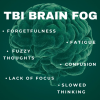Neurofatigue is reported by as many as 70 percent of traumatic brain injury patients and is a condition in which an individual experiences mental exhaustion. It is when your brain overworks itself and becomes “tired” due to a disruption in the brain’s circuitry system. After a brain injury, your brain has to use more energy to send electrical signals, thus making you feel more fatigued as usual. This can affect a patient’s motivation, activity level, emotions, and daily functioning.
There are two types of neurofatigue: cognitive neurofatigue and pathological neurofatigue.
| Type of Neurofatigue | Definition | Example |
| Cognitive | A condition in which the brain has to work harder during certain tasks and has to use lots of energy to keep up | Quickly feeling fatigued from:
|
| Pathological | A condition in which you feel physical fatigue after putting little effort into doing daily activities | Feeling physically tired from:
|
What causes fatigue?
Neurofatigue usually occurs when an individual engages in activities with many demands or prolonged cognitive tasks. It can also happen during situations with a high amount of sensory stimulation, such as a noisy environment.
Fatigue is normal for everyone but for people with TBI, fatigue occurs more quickly and frequently than it does for non-injured people. The exact cause of fatigue for TBI patients may be due to the extra effort and attention it takes to do even simple activities like speaking clearly. Brain functions are less “efficient” than they were before the injury and it needs to work harder to do things that were easy. Fatigue gets worse at night but is sometimes alleviated after a good night’s sleep.
Neurofatigue will sometimes lessen as the patient heals and becomes more mentally active and back to his or her old self. Neurofatigue goes with depression and gets worse with stress. Sleep may not help, and it’s most likely at its worst when a patient wakes up in the morning.
Neurofatigue is associated with changes in the synaptic concentration of neurotransmitters within the central nervous system. The CNS includes both the brain and spinal cord which affects mental performance and muscle function. If the body is a car, then the nervous system is its driver.
The brain has many receptors that track nutrition and body functions and it can reduce the motor commands sent from the central nervous system. This function is crucial to protect the body and to keep it in a proper state capable of recovery.
The brain tells endurance athletes to protect internal organs from dangerously high core temperatures and get the proper nutrients. The central nervous system alerts the body when to rest or refuel.
Symptoms of neurofatigue may include:
- Rapidly feeling drained after mental activity
- Feeling more fatigued towards the end of the day
- Difficulty concentrating or paying attention
- Sleep disruptions
- Mood swings or irritability
- Difficulty tolerating stress
- Headaches
- Dizziness
- Sensitivity to light or loud noise
Everyone knows what physical muscle fatigue feels like. It’s a feeling of exhaustion and tiredness that zaps you of your energy.
But after a Traumatic Brain Injury, a patient may have more than one kind of fatigue. There is physical fatigue, which means your body is tired and needs to rest. There is also psychological fatigue which translates to not being motivated to do anything, even get out of bed.
Being depressed wears a TBI patient out and some days they do not feel like doing anything. There is also mental fatigue, which makes it hard to focus and the mind just goes blank.
Why is fatigue important?
When you are fatigued, you are not able to think clearly or accomplish any physical activity. If a TBI patient is overwhelmed by fatigue, he or she has less energy to care for themselves and do things they enjoy.
Fatigue has a negative effect on mood, physical functioning, attention, concentration, memory and communication.
It can also interfere with work or recreational activities. Fatigue can actually make activities dangerous like driving.
How common is fatigue after Traumatic Brain Injury?
Fatigue is one of the most common problems patients have after a TBI. It’s reported that over 70% of survivors complain of mental fatigue.
What can be done to decrease fatigue?
- Pay attention to triggers and learn to identify the signs of neural fatigue, like becoming irritated, and distracted.
- Stop an activity before getting tired.
- Get more sleep and rest. If you have insomnia, ask your doctor. there may be a medical reason and useful treatments.
- Set a regular schedule of going to bed and waking up at the same time every day.
- Regular rest breaks or naps, but be careful to limit naps to 30 minutes and avoid evening naps.
- Alcohol and marijuana will generally make fatigue worse.
- Caffeine should be avoided if sleeping is a problem
- Resume activities gradually and start with familiar that can be completed without fatigue. Gradually increase the complexity of each task.
- Take breaks as needed.
- Plan frequent and regular breaks in your daily schedule
- Pace yourself during activities
- Break down activities into smaller steps
- Get 8-10 hours of sleep
- Exercise
- Eat healthy and nutritious meals
- Yoga or meditation



